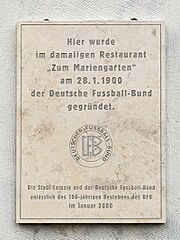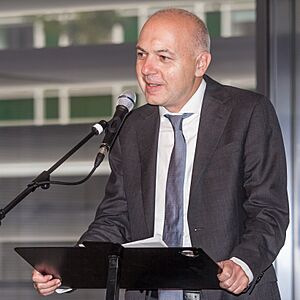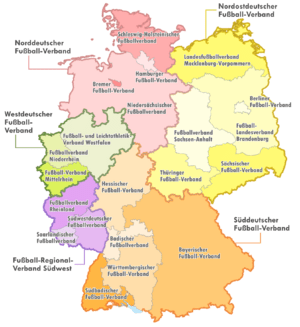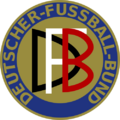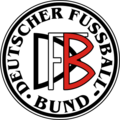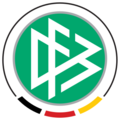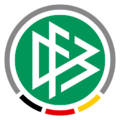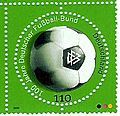German Football Association facts for kids
| UEFA | |
|---|---|
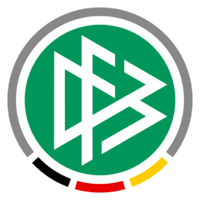 |
|
| Full name | Lua error in Module:Wd at line 1575: attempt to index field 'wikibase' (a nil value). |
| Short name | DFB |
| Founded | 28 January 1900 in Leipzig |
| Folded | Lua error in Module:Wd at line 1575: attempt to index field 'wikibase' (a nil value). |
| Headquarters | Lua error in Module:Wd at line 1575: attempt to index field 'wikibase' (a nil value). |
| FIFA affiliation | 1904 |
| UEFA affiliation | 1954 |
| President | Bernd Neuendorf |
The German Football Association (in German: Deutscher Fußball-Bund, or DFB) is the main organization in charge of football in Germany. It also manages other forms of the game, like futsal and beach soccer.
The DFB was one of the first members of both FIFA (the world football organization) and UEFA (the European football organization). It runs Germany's football leagues, like the famous Bundesliga. It is also in charge of the German national teams for both men and women.
With over eight million members, the DFB is the largest sports group in the world. Its main office is in Frankfurt.
Contents
The History of German Football
The DFB has a long and interesting history, with many changes over the years.
How It All Began (1875–1900)
Before 1900, the most popular type of football in Germany was actually rugby. But soon, clubs that played modern-style football (also called association football) started to form. By the 1890s, these clubs began organizing themselves across the country.
The DFB is Born (1900–1933)
On January 28, 1900, representatives from 86 football clubs met in the city of Leipzig. They voted to create the DFB to unite all the different football competitions in Germany. A few years later, in 1904, the DFB joined FIFA. The first official game for the German national team was played in 1908.
At that time, Germany's borders were different. Football clubs from German-speaking areas in other countries, like Bohemia (then part of Austria-Hungary), could even play in the German championship.
A Difficult Time (1933–1945)
During the 1930s and 1940s, Germany was ruled by the Nazi government. This government took control of many parts of life, including sports. The DFB was forced to follow the government's rules.
One of the worst changes was that Jewish players and officials were forced out of the sport. For example, the records of Gottfried Fuchs, a Jewish player who scored a record 10 goals in one game for Germany in 1912, were removed. For many years, the DFB did not acknowledge his amazing achievement.
The government's control made the DFB much less powerful. After a poor performance at the 1936 Summer Olympics, football became less important to the country's leaders.
Rebuilding After the War (1945–1963)
After World War II, Germany was divided into West Germany and East Germany. The old DFB was shut down by the Allied forces who occupied the country. For a few years, German teams were not allowed to play internationally.
In 1950, the DFB was officially re-created in West Germany. Soon after, German teams were allowed to compete again. This led to one of the greatest moments in German football history: West Germany won the 1954 FIFA World Cup. This victory, known as the "Miracle of Bern," helped make football incredibly popular across the country.
The Modern Era (1963–Present)
After some disappointing results in the early 1960s, the DFB decided to create a single, professional football league. In 1963, the Bundesliga was born, and it quickly became one of the best leagues in the world.
The DFB has hosted the FIFA World Cup twice, in 1974 and 2006. When Germany was reunified in 1990, the East German football association joined the DFB.
The men's national team has won the World Cup four times (1954, 1974, 1990, 2014) and the UEFA European Championship three times.
The DFB has also been a leader in women's football. The women's national team has won the FIFA Women's World Cup twice (2003, 2007). Their 2003 victory made Germany the first country to win both the men's and women's World Cups.
DFB Competitions
The DFB and its partners organize many competitions for men and women.
Men's Competitions
|
Women's Competitions
|
How the DFB is Organized
The DFB is a huge organization. It is made up of five large regional associations and 21 smaller state associations. These groups are responsible for organizing football in their part of Germany.
Every football club in Germany, from the biggest professional teams to the smallest local clubs, is a member of one of these state associations. In total, there are over 25,000 clubs in the DFB.
Men's National Team Achievements
The German men's team is one of the most successful in the world.
'Champions (4)': 1954, 1974, 1990, 2014
'Champions (3)': 1972, 1980, 1996
'Gold Medal (1)': 1976 (by East Germany)
'Champions (1)': 2017
Women's National Team Achievements
The German women's team is also a global powerhouse.
'Champions (2)': 2003, 2007
'Champions (8)': 1989, 1991, 1995, 1997, 2001, 2005, 2009, 2013
'Gold Medal (1)': 2016
DFB Mascot
The official mascot of the DFB is an eagle named Paule. He has black feathers and a yellow beak and has been cheering on the teams since 2006.
Images for kids
See also
 In Spanish: Federación Alemana de Fútbol para niños
In Spanish: Federación Alemana de Fútbol para niños
- German football league system
- German Football Museum
- History of German football
 | Janet Taylor Pickett |
 | Synthia Saint James |
 | Howardena Pindell |
 | Faith Ringgold |


